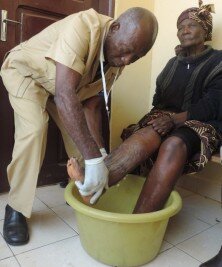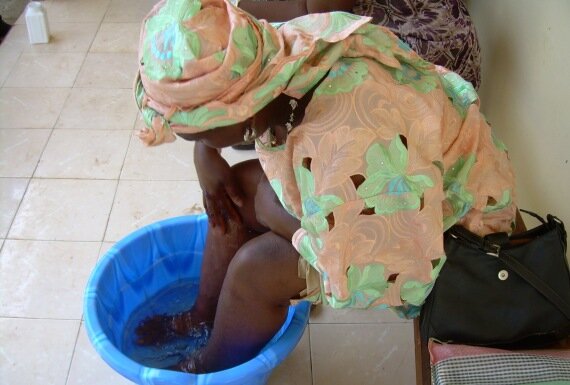Guest blog post by Wendy Santis, Footwork Executive Director
Twenty-five members of Cameroon’s Ministry of Health, and nurses and leaders from Mbebah Vigilantic Farming and Development Association — a community development NGO in Northwest Cameroon — received training this past December in podoconiosis diagnosis, prevention and mitigation.
Podoconiosis, a type of elephantiasis spread by chronic exposure to irritant soils, has been reported in over 15 countries across tropical Africa, Southeast Asia, and Latin America in volcanic highland zones, and is an important cause of tropical lymphedema. This neglected tropical disease (NTD) is primarily found in remote rural areas where subsistence farmers typically work in the fields barefoot. It causes progressive bilateral swelling of the lower legs. It is not infectious — no virus, bacterium or parasite is responsible.
The exchange training visit in Cameroon, which aimed to strengthen the Northwest region’s ability to control podoconiosis, was funded by Footwork: The International Podoconiosis Initiative (a project of New Venture Fund, a 501c3 public charity), Brighton and Sussex Medical School and International Orthodox Christian Charities (IOCC). Participants included three IOCC staff who are involved in podoconiosis prevention and treatment programs in Ethiopia: Hari Desta, Tsige Amberbir and Abreham Tamiru. They, plus Footwork Executive Director Wendy Santis, worked with Professor Samuel Wanji’s team from the University of Buea/Research Foundation for Tropical Disease and Environment.
 Since 2009, IOCC, in collaboration with Gail Davey, Professor of Global Health Epidemiology at Brighton and Sussex Medical School, and Footwork’s founder, has developed a scalable model to address podoconiosis with an aggressive prevention and treatment program in Ethiopia, where more than three million people suffer from this debilitating disease of the feet and legs and another 38 million are at risk. Through this IOCC model, more than 300,000 children and adults have been assisted through awareness, prevention and treatment efforts.
Since 2009, IOCC, in collaboration with Gail Davey, Professor of Global Health Epidemiology at Brighton and Sussex Medical School, and Footwork’s founder, has developed a scalable model to address podoconiosis with an aggressive prevention and treatment program in Ethiopia, where more than three million people suffer from this debilitating disease of the feet and legs and another 38 million are at risk. Through this IOCC model, more than 300,000 children and adults have been assisted through awareness, prevention and treatment efforts.
Data and recommendations are being shared with Cameroon’s Ministry of Health planners to inform policy decisions regarding community-based management of morbidity due to podoconiosis with the goal of eliminating podoconiosis in the region and the country. A Northwest region podoconiosis advocacy committee has been formed to further these efforts.
This work is extremely important, considering two million people (10 percent of Cameroon’s population) are at risk of podoconiosis. Mapping in Northwest Cameroon has demonstrated that podoconiosis is endemic in this region. Several thousand people are affected with a mean prevalence of 1 percent. Further mapping is planned.
To learn more about Footwork and podoconiosis, visit: www.podo.org.
In addition to Cameroon, Footwork is active in Ethiopia and plans to work in Uganda and Rwanda, among other countries. It encourages integration of podoconiosis control into efforts to eliminate other NTDs, and works with those active in other related diseases of the foot and leg.
- Our shared goal is to eliminate podoconiosis within our lifetimes.
- Our vision is a world free of podoconiosis in our lifetimes.
- Our mission is to bring together public and private partners to support prevention and treatment of, and advocacy for, podoconiosis.

